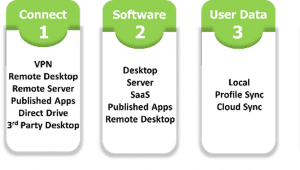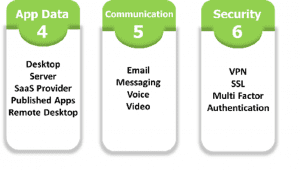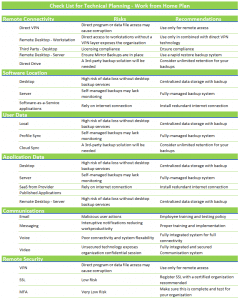In April 2020, the world shut down, and everything changed.
The COVID-19 pandemic impacted all facets of our lifestyles: how we socialize, shop, attend school, access medical or social care, and emphatically how we work and collaborate.
During the early shutdown, IT Force spent our time collaborating with our clients to ensure their businesses could carry on and operate in a pandemic world. The number one priority was to get their team productive from home.
Forrester found that our clients were not alone; the number of remote information workers ballooned from 8% to 69% in the United States.
Our clients sought guidance on enabling their mobile workforce and fine-tuning their security posture for home-based users.
Categories of Readiness
As we examined their environments and set a path to enable work-from-home capabilities, four clear categories of readiness emerged:
- On-Premises: physical IT equipment at a business location(s).
- Hybrid Cloud: some IT applications or services moved to the cloud (IE. Microsoft’s 365, Hosted Exchange, and software-as-a-service or SaaS applications), but most business applications running on physical IT equipment at a business location(s).
- Private Cloud: a central cloud environment in a primary business location, allowing users to work remotely.
- Public Cloud: all users access all applications and data from a public cloud platform (Microsoft Azure, Amazon Web Services, Google, and SaaS solutions) from any location equipped with an internet connection.
Once we identified our client’s state, there were many considerations to defining their personalized path to remote productivity. We have collected the common concerns and summarized them into buckets, as seen in the chart below.
For those who may not have a technical background, use this chart as a quick reference guide to ensure you and your IT team have not missed any considerations in building your remote workspace digital transformation strategy.
Reference Checklist to Plan for a Remote Workforce

 Each of these elements drives a more in-depth technical discussion that your IT team will need to ensure you have aligned your security posture with your level of risk tolerance.
Each of these elements drives a more in-depth technical discussion that your IT team will need to ensure you have aligned your security posture with your level of risk tolerance.
Our second chart offers a basis for that deeper discussion, outlining some risks, dependencies, and recommendations that can support the detailed development of your digital transformation plan.
